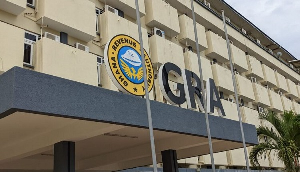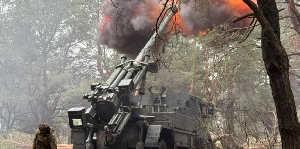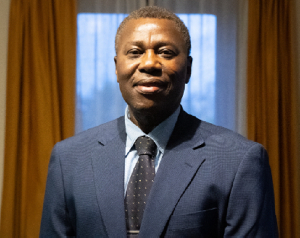FIGURES OF casualties from the Dudzome boat disaster have been sharply contradicted by several survivors and residents of the area at a loss for reasons why there should be an attempt to mask the statistics.
While journalists strongly believe the death toll could be on the high side, and possibly close to two hundred, the District Chief Executive for Jasikan, Hon. Solomon Donkor, and the Minister for Ports and Habours, Professor Ameyaw Ekumfi, say the figure could not be more than ten.
In fact the DCE told listeners of HOT 93.9 FM, an Accra radio station, on Tuesday that there were 65 people on board the boat and that only nine of them died. However, the minister told the nation at a press conference on Wednesday that there were 'actually' 74 people in the boat, out of which ten died.
However, survivors and eyewitnesses say those figures are woefully erroneous. They told 'The Chronicle', in their accounts, that other smaller canoes also capsized and that they had to bury some of the dead along the way to Tapa-Abotoase.
At least five of the survivors spoke to the paper last Friday, intimating that they would be ready to testify to prove their side of the story, which grossly contradicts the official accounts.
Starting from the alleged inhuman treatment meted out to them by the officials of the Wildlife Division at Digya National Park in the Afram Plains before they were forced into the boat and some twenty canoes. They hinted that they were ejected from 10 communities in the area, and those numbered a few thousands.
According to them, the harassment and pressure to get them ejected started two months ago.
The settlers, who were mainly from the Keta district in the southern part of the Volta region, had lived in such communities in the Afram Plains as Hedzo, Zikpo, Supong - Odume, Agrafi, Tanakope, Agege, Yamoso, Kolekope, Kwaehumu and Sakpiti for the past 38 years.
A survivor of the boat disaster, Mana Agbemava, who hailed from Bleamazado in the Keta district, told this reporter that some 8,000 of them had been kept at Machare, a distant community at the lakeside for a month.
She stated that last week Friday, the officers came to their "new homes" at gunpoint, beating them up and forcing them into any available boat.
"We stayed here cooking, bathing and doing any other thing for a month. They finally parked us like sardine together with our sheep, goats, fowls and charcoal. We were about two hundred in the boat I boarded before it capsized, and only a few of us survived," she said.
Agbemava recounted how another boat that was following theirs on the lake, also submerged. The middle-aged woman said even though she could not tell the exact number of people in that boat, she strongly believed it carried more passengers than theirs because it was much bigger and could carry more people.
Sobbing, she said her nine-month baby survived by what she described as 'the miraculous hand of God', and thanked Madam Mercy Kpnoe, senior staff nurse at the Tapa Abotoase Health Centre for reviving the little boy, who was then unconscious.
Another survivor, Wisdom Abotsi, from Anyako said he had left behind his farms, corn mill and other belongings, which took him several years to acquire.
He said within the period that they were held captive in the camps at gunpoint, they were beaten and treated like slaves. He also confirmed that over a hundred people in the boat could not be accounted for after the accident.
Mama Gbadegbe, another survivor who said she was on her first trip to the area, said the boat she boarded was hit by a storm.
"Water filled the boat instantly, and I believe that over 100 people died in that accident alone because we could not find them when we were rescued, and it had been four days since then; so the chances of finding them alive is slim."
She however express concern over how the Wildlife staff severely beat her without any provocation and said that was her first time on a visit to her sister at the Agordeke village.
Hope Ashiagbor, a survivor, said the death toll of the disaster could exceed two hundred because there were many smaller canoes, which various families were forced into; one of which sunk in a similar accident and nine people died in the process. He hinted that many others died at the clinics.
He said most of the deceased were buried along the banks of the lake because of the fear of lack of money to go through the normal burial rites.
For her part, Patience Adabla, revealed that some members of the rescue team heartlessly removed monies from the pockets and bags of those found dead and those they were rescuing.
When contacted, the secretary of the Boat Owners Association at Tapa - Abotoase, Kaizaro Yao Awoye - Morganu, condemned the action by the Wildlife staff.
Madam Kpanoe of the Tapa Abotoase Health Centre said many of those in serious condition, mainly pregnant women, were referred to the Worawora hospital and Korle - Bu Teaching Hospital. One person is reported dead at Korle Bu.
What the Jasikan DCE and the Ports and Habours minister failed to factor in their estimations is that it is impossible for the entire population of ten communities to total just seventy-four, all of which boarded one boat. Apart from that, many people think the list of names presented by the minister at the press conference was very misleading and could be falsified because no rural boat in this part of the country has a list of people on board before any journey, more so in a speedy ejection.
Curiously the Minister for Lands, Forestry and Mines, Prof. Dominic Fobih, whose ministry did the evacuation, and should have known how many people they 'kicked' out of the area has remained silent since the incident.
General News of Thursday, 13 April 2006
Source: Ghanaian Chronicle












